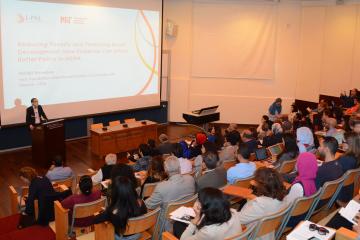
Youth economic inclusion in Morocco: An evidence sharing seminar

The Morocco Employment Lab was launched in 2020 as a joint partnership between J-PAL and Evidence for Policy Design, in partnership with the Millennium Challenge Account Morocco Agency and hosted at the Policy Center for the New South. The Lab aims to improve the effectiveness of programs and policies through rigorous impact evaluations and capacity building, ultimately helping build a culture of evidence-informed policymaking in Morocco.
With this goal in mind, the Morocco Employment Lab (MEL) hosted an Evidence Sharing Seminar on youth economic inclusion last month.
At the seminar, Dr. Younes Sekkouri, Minister of Economic Inclusion, Small Business, and Skills in Morocco, reaffirmed that a key priority of the government is to foster youth economic inclusion, building pathways to wealth creation and social mobility for youth and fundamentally changing their perspective of their place in society. The minister called for a new, evidence-based approach to policy making to create real, quality jobs for Moroccan youth.
The Minister’s call for action echoes the difficulties that youth face participating in the existing labor market. In 2020, the unemployment rate among Moroccans aged 15-24 reached 31 percent, nearly 10 percentage points higher than unemployment rates for the general population. A large portion of youth are also neither working nor in school or training programs.
These statistics point to the urgent need to find innovative and efficient ways to promote youth economic inclusion. As part of ongoing efforts to address this need, MEL hosted the seminar to create a space for dialogue between researchers and policymakers working in the labor market sphere.
The goal of the seminar was to identify policy priorities and evidence gaps, share evidence to inform policy for better youth economic inclusion and identify new leads for experimentation and evaluation. It was held early June in Rabat, Morocco, in partnership with the Millennium Challenge Account-Morocco, the National Labor Market Observatory, the World Bank, and the Policy Center for the New South.
In the lead-up to the conference, MEL also hosted a series of roundtables bringing together stakeholders and thought partners to discuss interventions in three areas:
- Youth skills and training
- Job search assistance and transition into the labor market
- Job creation—public works, wage subsidies, and entrepreneurship
The takeaways from these roundtable discussions were then presented at the seminar through three corresponding panels, in which panelists shared their experiences and insights into how to mitigate the challenges young job seekers face in Morocco.
These panelists represented key institutions, universities, government agencies, and nongovernmental organizations including the National Agency for the Promotion of Employment and Skills (ANAPEC), the Office of Professional Training and the Promotion of Labor (OFPPT), Education for Employment (EFE), and the World Bank Group.
Their expertise as people actively working in the research, development, and testing of new labor market interventions ensured a meaningful discussion of the values and pitfalls of each intervention discussed throughout the day.
Youth skills and training
The first panelists discussed three types of interventions that could strengthen youth skills: skills training combined with job matching, apprenticeship programs, and soft skills training.
The panelists presented evidence that basic skills training coupled with jobs matching can increase youth employment. First, they argued that these interventions can close the gap between what firms need and what young jobseekers can do by tailoring skills training to the needs of firms and connecting youth with firms. As such, these interventions can help youth not only acquire the skills needed to fill available positions, but also help them signal their skills to firms and make firms more willing to employ them.
The second type of intervention addresses barriers that prevent firms from hiring young job seekers as interns or apprentices. The panelists emphasized that small firms lack the resources to implement robust apprenticeship programs and that new programs ought to provide firms with incentives to hire and train interns. This intervention is designed to help youth receive critical on-the-job training and work experience that can in turn increase their employability.
The third type of intervention aims to improve skills that are not taught in the traditional education system but are critical to career development: soft skills. Here, the panelists discussed the importance of integrating soft skills training into the existing education system, especially skills that are common across industries, such as time management and self-management skills. This training would also assist youth in the job search process and facilitate their integration into the workforce.
Job search assistance and transition into the labor market
The second panel addressed the effectiveness of interventions that help youth navigate the job search process. Panelists highlighted the positive impact of programs that teach youth how to properly signal their skills to employers, improving youth employment, job quality, and earnings. These programs also improve labor market outcomes by making it easier for businesses to screen candidates for open positions, helping them to make better hiring decisions.
However, the panelists also emphasized the need to tailor job search assistance programs to address factors that disadvantage some youth relative to others in the job search, specifically gender discrimination, regional differences, and education level. For example, women could face gender discrimination during the hiring process and restrictive norms about the types of jobs they may perform. These affect their job search behaviors and their ability to enter the labor market.
Differences across rural and urban areas and differences across regions also play a crucial role in youth job search behaviors. There may be particularly few job opportunities in certain regions, leaving some youth worse off in the search for good jobs. The panelists asserted that job assistance programs ought to address these constraints, including by making information more accessible to youth in rural areas and across regions and inform their decision to migrate for employment. In this context, panelists also highlighted the role that regions play in supporting youth economic inclusion.
Furthermore, the panelists discussed the need for programs that assist youth across education levels. Low-skilled job seekers tend to land in jobs in the informal sector, where they lack the stability and protections that cover formal sector workers. The panelists spoke of the need to develop programs that target young low-skilled job seekers and connect them to opportunities in the formal sector, or otherwise improve their employability.
Job creation: Public works, wage subsidies, and entrepreneurship
The focus of the third panel was analyzing the effect of mass employment programs to provide employment opportunities to youth—such as public works programs, wage subsidies to firms, and measures to foster entrepreneurship among youth.
The panel first discussed evidence on public work programs, especially as Morocco just launched a new public works program, Awrach. Through these programs, governments aim to provide temporary employment for the creation of public goods, such as roads or infrastructure, in exchange for a remuneration at the minimum wage or below.
Evidence from other contexts shows that these programs can improve short-term employment and serve as a social safety net, as only the most disadvantaged self-select into the program. However, the skills acquired might not necessarily match the needs of the regular job market and these programs were relatively expensive to implement in the contexts evaluated.
Wage subsidies aim to incentivize firms to hire youth by compensating their hiring costs. The panelists emphasized the importance of considering the diverse needs of firms when designing these subsidies. For example, the size of a wage subsidy may vary according to the size of the firm and whether the subsidized workers are expected to become more productive over time.
Additionally, panelists hailed the relative success of programs that provide youth entrepreneurship training and access to capital to begin businesses. Similarly to the first panelists, they spoke of the benefits of integrating soft skills education and other useful business-oriented skills training into the education system. These programs allow youth to develop the skills they will need to succeed in business.
Building on this first Evidence Sharing Seminar, MEL aims to continue fostering collaborations between researchers and policymakers to identify, test, and evaluate innovative solutions to address other issues impeding the development of the Moroccan labor market, including low female labor force participation rates and widespread informality. To receive information on our work and upcoming events, follow MEL on LinkedIn.



